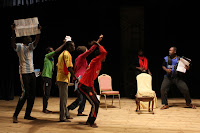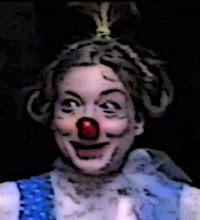To begin a dramatic exploration of the issues, we gave the students an assignment to create a phrase and movement that represents one of the chosen themes. What they created in this 10-minute exercise was amazing. Here is one movement piece:
The students also created several deeply affecting pieces on the issue of cultural identity. In one piece, a woman stands up in the audience and cries out “Who am I?” She runs to the stage, approaching her fellow citizens who turn away. Another approaches with same question. Little by little they come together and collectively ask the audience: Who are we?” They then burst forth with great urgency, demanding: “Who are we?! Who are we?! WHO ARE WE?!”
The students also created a compelling, and comedic, scene about the dire unemployment situation for young college graduates and how you can only get a job if you have a connection. Additionally, they developed a piece about the lack of acceptance in society of artists and innovators; how there is no space for new innovation and no appreciation for artists. This was a recurring theme in their discussions. These young men and women want to push boundaries, and make room for new ideas and new possibilities. As artists, they want to be free to express themselves.
At one rehearsal what began as a simple physical warm-up erupted into a spontaneous dance party. There was such wonderful energy and expression! "Perfect, this is how we end the play!," I exclaimed. I wanted the show to end in a moment of celebration. No, no, we were then told. This is not appropriate. The students cannot move like that on stage in front of the public. We were also told, the boys and girls cannot hold hands. The students protested that this is what they do in life, they do it at the university and it's fine. I advised that we acquiesce on this one. We were lucky the government representative had said nothing so far about other aspects of our presentation.
The students also created several deeply affecting pieces on the issue of cultural identity. In one piece, a woman stands up in the audience and cries out “Who am I?” She runs to the stage, approaching her fellow citizens who turn away. Another approaches with same question. Little by little they come together and collectively ask the audience: Who are we?” They then burst forth with great urgency, demanding: “Who are we?! Who are we?! WHO ARE WE?!”
In another piece, a group of Arabs enter dancing a traditional Arabic dance and meet a group of Africans dancing a traditional African dance, very different from the former. They see each other, stop and warily circle around each other. Eventually they couple up, one African and one Arab, and all come together. Out of their union, three babies are born. The children are confused. Because the north and the south are divided (as the country has recently been). They do not know who they are and where they belong. Are they Arab like their father, or African like their mother? They collapse in a state of fear and despair. It was quite poignant and profound! The piece then developed so that the children torn between the two in the end find that they are enriched by both, and thusly declare “We are Sudanese.”
 |
| At the unemployment office |
At one rehearsal what began as a simple physical warm-up erupted into a spontaneous dance party. There was such wonderful energy and expression! "Perfect, this is how we end the play!," I exclaimed. I wanted the show to end in a moment of celebration. No, no, we were then told. This is not appropriate. The students cannot move like that on stage in front of the public. We were also told, the boys and girls cannot hold hands. The students protested that this is what they do in life, they do it at the university and it's fine. I advised that we acquiesce on this one. We were lucky the government representative had said nothing so far about other aspects of our presentation.
In developing our play, aware of the sensitivity of the issues, we focused on movement and imagery and incorporating comedic elements. We made sure to include positive perspectives and solutions. Two clownish narrators begin the show and provide commentary and comic relief, guiding the audience along the journey, which begins with a declaration of love for Sudan. We then present three problems: Unemployment/Freedom of Artistic Expression/Arab vs African. We end on a positive note of togetherness: We are all Sudanese and together we can make Sudan even greater.
There was a lot of debate about how to present things, what would be appropriate and what adjustments we might need to make. Even as we cloaked our message in comedy and mime, it was still obvious and possibly too obvious. Talking about problems at all was just too controversial. At the end of our last rehearsal, one of the organizers came and voiced concern about what was safe to say. Despite warnings, the students were adamant to proceed with what they had created. They said, “This is what we want to say.” “These problems exist. Others have already talked about them, we’re not the first.” “We are drama students, we are in the arts – this is what we do, we must express ourselves.” They said to me: “You asked us what the problems are. So we are telling you.”
I assumed the students would know how far they could go. After all, they live in Sudan, I don’t. But as rehearsals progressed, it became clear they don't know what the boundaries are, or they don't care. This was challenging to navigate. I felt responsible because I was directing them and leading them. I was not sure how serious the situation was going to get. At one moment it seemed it wasn’t a big deal. The next I had the impression there could be major consequences. For the students, and for us. I half-expected an Argo-like escape to the airport at the last minute. On dress rehearsal night rumors floated of possible protests and government-placed fire trucks at the ready to hose us down at any moment. Would we even be able to do the show?









No comments:
Post a Comment